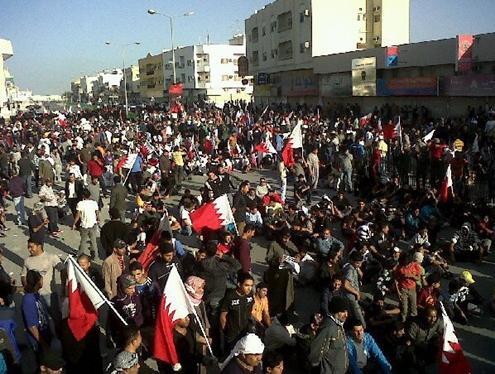Questions over Saudi support in Bahrain
By Laura Lynch
Saudi Arabia’s decision to send troops to Bahrain has had an unexpected side effect. The United States and Iran have found themselves in agreement. Both countries are criticizing the use of force against protestors, and the intervention of foreign forces in the country, and there are concerns that the conflict might escalate.
Next door, in Saudi Arabia, the government, which is contending with much smaller protests in the eastern region of the country, is well aware the Shiite minority there is drawing inspiration from the demonstrations in Bahrain. Last week, Gen. Mansour al-Turki, a spokesman for the Saudi Interior Ministry, suggested foreign influences are trying to create instability.
“They’re not actually living in the country; they do not understand the people of the country. They’re trying to take advantage of what’s going on and trying to find those who probably support their ideas or who support their attitude.”
That may well have been a veiled reference to Iran. It has suddenly become a very public defender of downtrodden Shiites living in the region. On Wednesday, Iran’s president Mahmoud Ahmedinajad, who has overseen violent crackdowns on Iranian protestors, condemned the clashes in Bahrain. Without naming Saudi Arabia, he warned other governments not to interfere to aid a regime supported by the United States.
In the strange twists and turns of geopolitics in the region, even as Ahmadinejad criticized the US for acting in its own interests, he echoed Washington’s call for negotiations instead of violence.
Sunni-dominated Saudi Arabia and Shia-dominated Iran have long competed for influence in the Middle East. That’s why Madawi Al-Rasheed of King’s College in London is concerned about Saudi troops entering Bahrain.
“The fact that Saudi Arabia is moving is actually a bad sign,” Al-Rasheed said. “There is a high risk that this is the beginning of a fully fledged sectarian war with the help of outside forces.”
Inside Saudi Arabia itself, Shiites are watching events in Bahrain closely.
“I want the Saudi government to stop this bloodshed and endless clashes,” said Tawfig Alsaif, a Shiite, who’s a political analyst living in the country’s eastern province.
“Sending troops [into Bahrain] is not something I can welcome because I know the situation there requires mediation between the opposition and the government rather than supporting a particular side.”
Far from quelling discontent, Alsaif expects the violence in Bahrain to lead to more protests by Shiites in Saudi Arabia.
It seems that’s a risk the government in Riyadh is willing to take.
